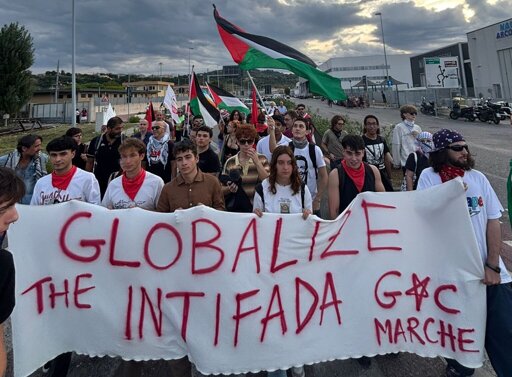Dock workers in Italy last month threatened to “block everything” if Israel attacked the Global Sumud Flotilla, carrying meager but vital aid for Palestinians amid the ongoing genocide in Gaza. On September 8, Israel subjected the flotilla to drone attacks while in a Tunisian port, and the workers of Italy held their promise: They blocked everything.
Building a Gaza solidarity movement
The Italian General Confederation of Labor (CGIL) kicked off a series of national strikes on September 16 by CGIL, which has over 5 million members. Spanning more than 80 cities, the strike blocked train stations, ports, universities, and public administration offices. The transit of goods was “slowed or partially blocked by workers’ sit-ins and rallies in Italy’s main ports of Genoa and Livorno.” “If we don’t block what Israel is doing, if we don’t block trade, the distribution of weapons and everything else with Israel, we will not ever achieve anything,” Walter Montagnoli, national secretary of the Base Unitary Confederation (CUB) union, told reporters.
This urgent intervention comes years into a catastrophic humanitarian crisis that has been livestreamed on our phones and funded by our governments with weapons shipped from ports around the world to continue carrying out genocide. A massive act of solidarity in a precarious world, these strikes underscore the power of withholding labor to slow the gears of the war machine that cannot churn without access to labor, ports, and goods.
Response from Israel
Italians didn’t stop there. When Israel yet again (and illegally) attacked the Global Sumud Flotilla as it neared Gaza by sea, CGIL and the Unione Sindacale di Base (USB) called for another general strike on October 3. This was the first time that all the leftist unions in Italy decided to go on strike together. More than 2 million people — workers, students, families — took to the streets in support of the people of Gaza.
“The marches … were composed of industrial workers, students, migrants, and second-generation migrants,” a USB organizer said. “There was an incredible, never-before-seen diversity. Even small bar owners, people outside the unions, everyone stood side by side in a multiethnic crowd. This is the Italy we love, standing against the racism of Meloni and Salvini.”
Working-class support
Trump-aligned Prime Minister Giorgia Meloni openly opposed the strike, claiming the strikers simply didn’t want to work, while her deputy prime minister Matteo Salvini wanted to impose fines on those “striking illegally.” A new security law introducing criminal penalties for blocking roads and railways did not stop the masses of people from doing exactly that, and attempts to criminalize protest was met with a groundswell of solidarity in the streets.
The strike was widely supported publicly, with participation in some factories exceeding 80 percent. This success was also due to years of sustained organizing by social movements, students, and Italy’s Arab communities. After the second strike, Meloni issued a ban and a withdrawal of licenses on arms exports to Israel, the first time she’s done so in the past two years.
Connecting strikes to daily lives
Marika Giati, a doctoral student and part of the Women’s Assembly of the New Migrants Coordination in Bologna, told Truthout that “a new consciousness could be felt” during the strikes, which connected this action to massive mobilizations taking place around the world. She noted that “many people went on strike for the first time in their lives,” and did so despite “an economic crisis that is eroding their wages, aware that this impoverishment stems from the effects of a war that goes even beyond Gaza: one that directly concerns us because it is transforming European societies themselves, driving an unprecedented surge in rearmament and militarism.”
Labor Notes reports how in recent months “awareness has grown within the CGIL and among Italian workers of the connection between the genocide in Palestine and the larger political picture in Italy … many European governments are pushing for rearmament and taking a more authoritarian stance — to the detriment of working people.”
Matilde Ciolli, an activist with the Transnational Migrants Coordination and postdoctoral fellow at the University of Aosta Valley, who was present at the demonstrations, told reporters that the strike “wasn’t only an act of solidarity with Palestine and a call to end the occupation and genocide — the recent absurd Trumpian ‘peace negotiations’ were also connected to the broader war scenario taking shape in Europe, of which Palestine represents the most acute expression. For this reason, workers used the strike as a tool to declare that they are no longer willing to accept the living and working conditions produced by war.”
The power of the strike
Workers in Italy have been extremely successful in using the strike as a tool against war and connecting this with their lives at work. Though Israel and Hamas have reached a ceasefire, Ciolli warns of how the proposed “peace plans” envision “a future of greater subordination and poverty for Palestinians in Gaza.” Dockworkers from Ravenna imagined a “durable project capable of halting the arms trade as a whole.”
Plans to do so are already in motion: CGIL is organizing a national demonstration in Rome later this month that will stand “against rearmament, against genocide, and for peace, the welfare state, and the rights of young people, workers, and pensioners.”

